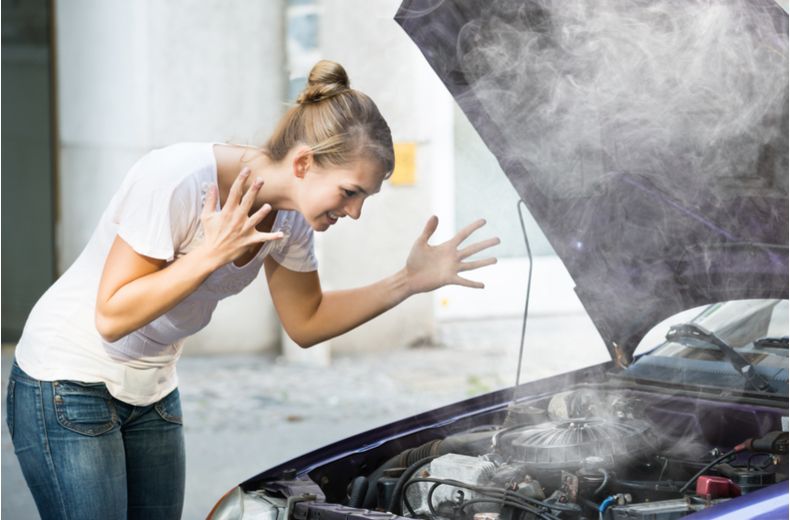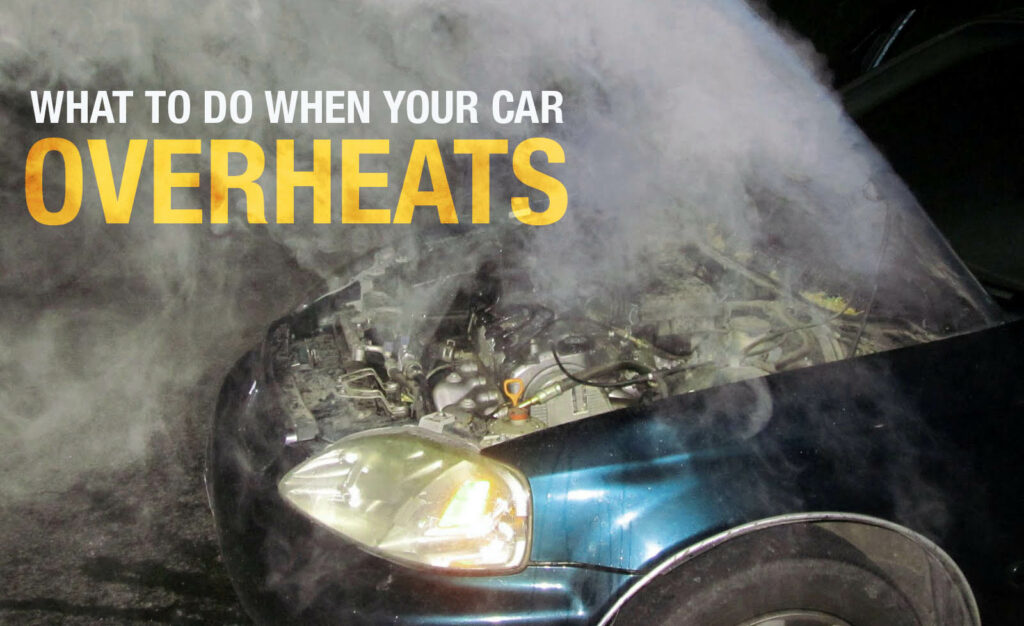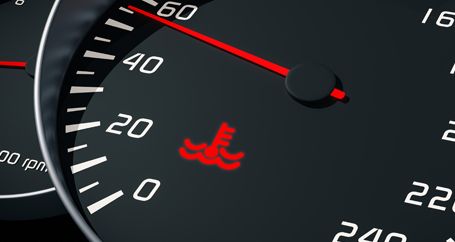3 If you happen to have a water bottle use it to fill the radiator if the car is out of water. What Happens When a Car Overheats.
 What Do I Do If My Car Is Overheating Rac Drive
What Do I Do If My Car Is Overheating Rac Drive
If youre able to take steps to cool your engine before it overheats to the point of failing you may reduce the risk of irreversible engine damage.

What happens when your car overheats. When you hit highway speeds however your engine needs a lot of coolant flowing through to keep it cool. Your engine may be able to stay cool at low speeds because its not working that hard and therefore not creating as much heat. If a head gasket blows even slightly the engine might overheat and damage several components.
Most modern cars have a liquid-cooling systemwhereas older cars are air cooled. One of the most worrisome problems you can experience is when your car is overheating. Seals When the engine overheats the seals begin to melt dry out or crack -- all of which can cause leaks.
Now that weve covered what you should do to save your engine when your car overheats lets go over the many possible reasons a car overheats in the first place and what steps you can take to fix it. Coolant is extremely important for your car because its the fluid that chemically absorbs heat from the engine and dissipates it through the radiator. One thing you should never do when your car is overheating.
Strange smells or odors emanating from the front of the car particularly near the hood. Overheating is when the temperature of the engine climbs to a point where mechanical damage can occur. Usually a sustained temperature of over 240 degrees fahrenheit is enough to cause concern.
Several quarts of oil. Most of the time when this kind of thing happens the driver doesnt have the resources on hand to do anything useful says Seyfer. This is the most common reason that causes an engine to overheat.
What can cause the most worry for you is the cost to fix your overheating car. Coolant is also commonly called anti-freeze. But it is more likely to occur through some fault in the cooling system itself.
40 to 80 Degrees Over If your engine overheats to this degree youll likely experience a noticeable drop in power while driving across Johns Creek and your engine might sound like its a tin can full of rattling coins. Common Reasons Why Your Car Overheats. Steam coming from the engine area a temperature gauge spiking to the red zone and engine warning lights often shaped like a thermometer are signs your vehicle may be overheating.
Theres a leak in the cooling system may have a leak. Leaking coolant can often have a sweet smell while oil leaks will typically produce a burnt odor. If you are driving a car that is overheating but still has coolant as in the case of having a faulty thermostat the high temperatures can cause the antifreeze to boil expand and cause intense pressure within the radiator hoses.
Although hot weather is the most common cause of overheating many other factors can cause the same problem. Your engine coolant is low The most likely culprit of your car overheating has to do with your liquid coolant. The most common symptom of a failed thermostat is overheating at highway speeds.
If your vehicle overheats in traffic in normal weather one of the following may be the culprit. Turn off the car as soon as possible and allow the vehicle to cool for at least 10 minutes. What Happens when my Car Overheats.
Here is a list of items to have on hand in the vehicle if your car engine overheats. Overheating can occur when one of the coolant passages in the engine block or head becomes clogged or starts to leak. If your cars engine overheats pull over as soon as its safe to do so says Donny Seyfer executive officer for the National Automotive Service Task Force.
Coolant also called antifreeze takes on heat to prevent your car from overheating. Leaks in the Cooling System. If your car is overheating on you it may be happening for a variety of reasons but there is only one thing you should initially do and its crucially important that you do it as soon as possible.
For instance there could be a leak in a hose that transfers the coolant from the engine to or from the radiator. It will reduce ignition timing and increase the amount of fuel injected into the engine. As the coolant temperature rises the Engine Control Unit the computer running your engine begins to take measures to protect the engine.
Pull over get off the freeway get into a parking lot. This can potentially result in hoses suddenly bursting or spraying hot coolant from a weak or broken seal. These types of vehicles have sensors that detect when the engine is overheating and will bring the car to a standstill.
Signs Your Engine is Overheating. Remove the radiator cap and check the. Steam which can look like smoke coming from under the car hood.
The water and coolant and water level in the radiator is low. Small basic tool kit. At this point overheating damage can mean damage to the bearings the wear surfaces in the engines interior and the top piston rings.
Low fluids means your engine wont have the chemicals it needs to cool off your engine. When an engine overheats the vehicle needs to be turned off immediately to avoid permanent damage. But first youve got to notice the symptoms of overheating which can include.
You will notice that the car slowly loses power and that the accelerator doesnt respond until the car stops completely. Not only can it leave you stranded somewhere but overheating can easily lead to a blown head gasket or a seized engine.
A coolant leak can occur when a foreign object is kicked up by the truck in front of you and penetrates the radiator. If your car is overheating on you it may be happening for a variety of reasons but there is only one thing you should initially do and its crucially important that you do it as soon as possible.

Overheating also causes a cracked engine block which can lead to oil leaks and a decrease in performance.

What happens if your engine overheats. Strange smells or odors emanating from the front of the car particularly near the hood. Valve stem seals for instance crack after an engine overheats. A cracked engine block is very expensive and inconvenient for both me as a technician and you as a car owner.
Strange odor leaking coolant often has a sweet smell coming from the front of the car. 2- if temperature attains higher value it can cause burning of engine oil and formation of carbon in beneath piston walls. Hence with cases when there is either leakage or the antifreeze mixturefluid is not properly circulating the engine or your car is running low in its coolant level the engine will start overheating.
This leads to a variety of oil-related problems including increased emissions. The AC causes an increased heat load on the system and the last thing you need when your engine is overheating is more heat. 20 to 40 Degrees Over If the temperature climbs 20 to 40 degrees above what is normal your vehicle might experience engine knock.
Any loose hose connection in the coolants circulation will cause a severe engine malfunction due to overheating. Pull over get off the freeway get into a parking lot. Once youve pulled over wait for the engine to cool before popping the hood to check things out.
If not addressed soon the head gasket will eventually fail and lead to leaks. Engine overheating damage may vary depending on how high the temperature rose. This problem usually occurs after only five minutes or after traveling about a mile.
If your engine is overheating but still running youre not doing it any favors by staying on the road. Overheating can occur when one of the coolant passages in the engine block or head becomes clogged or starts to leak. Overheating can warp the bore of the cylinder head and when that happens the pistons will have a hard time doing its job which can lead to pressure buildup and added engine stress.
Continuing to drive the vehicle while engine knock is occurring alongside higher temperatures can result in a cracked piston a shattered piston ring or a melted spark plug electrode strap. Theres a leak in the cooling system may have a leak. For instance there could be a leak in a hose that transfers the coolant from the engine to or from the radiator.
What Happens When a Car Overheats. First the pistons are made of aluminum which has a very high thermal expansion coefficient. They also have very little thermal mass so they heat up very very quickly.
There are many possible causes for your engine overheating but usually the issue lies in the cooling system of your engine. When the engine overheats the seals begin to melt dry out or crack -- all of which can cause leaks. What happens when your engine overheats.
Sure you may be able to get to your destination before it gives out entirely but you may cause significant and costly damage by pushing your engine too far. Engine overheating can cause various instantaneous and long term causes. DO NOT remove your radiator cap if your vehicle is overheating.
But it is more likely to occur through some fault in the cooling system itself. Turn off the car as soon as possible and allow the vehicle to cool for at least 10 minutes. Overheating -- 20 to 40 Degrees Over Depending on the engine design and the amount of carbon buildup in the cylinders your vehicle may begin to experience engine knock detonation.
Several quarts of oil. Other causes can be a faulty thermostat or a worn-out radiator. If youre out of coolant fluid or if theres a leak your engine can quickly become overheated.
Here is a list of items to have on hand in the vehicle if your car engine overheats. The engine block may be made of either aluminum or iron - if its iron it h. Small basic tool kit.
First know what happens when the engine overheats including. Engine runs fine but gets very hot shortly after you start it. If your engine is overheating shortly after you leave or it heats up even on short trips you should check the following possible causes and repair suggestions.
If your vehicle overheats in traffic in normal weather one of the following may be the culprit. The resulting cascade of fluid will see your engine overheat warp your heads. Leaking coolant can often have a sweet smell while oil leaks will typically produce a burnt odor.
It can cause knocking noise and lot of vibrations in engine causing damage to rotating parts and deformation. Steam may look like smoke coming from under the hood. The cooling system is under pressure and if you remove the cap you could get a face full of scalding coolant and steam.
The temperature gauge in the dashboard moving to the hot area. Dont open the hood immediately. The water and coolant and water level in the radiator is low.
If the head gasket fails it is very unsafe for you to drive your car and replacing it can be a very costly venture. Once in a safe location you will want to perform car overheating troubleshoot.